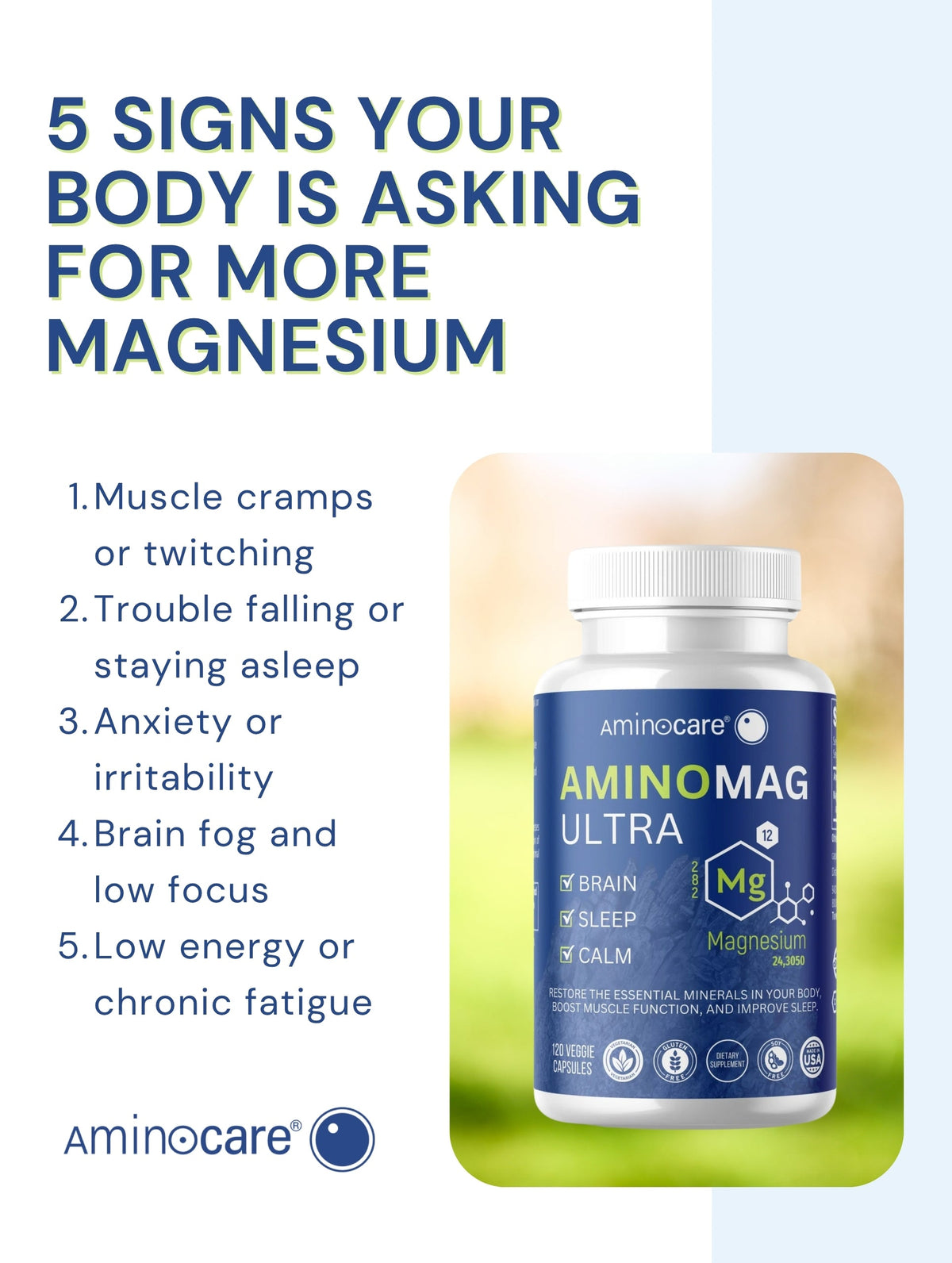*These statements have not been evaluated by the Food and Drug Administration. This product is not intended to diagnose, treat, cure, or prevent any disease. You should consult with a healthcare professional before starting any diet, exercise, or supplementation program, before taking any medication, or if you have or suspect you might have a health problem. If you experience any adverse condition after taking this dietary supplement, discontinue use immediately and consult your healthcare provider. Otherwise, do not stop taking medication without consulting your physician.
5 Signs Your Body Is Asking for More Magnesium

Did you know that magnesium is involved in over 300 biochemical reactions in the body? Despite its crucial role, many people are unknowingly deficient in this essential mineral. This post will explore five signs indicating your body might be crying out for more magnesium. By recognizing these symptoms, you can take actionable steps to restore balance and enhance your overall health.
Understanding Magnesium: The Marvel Mineral
Magnesium is often dubbed the 'forgotten mineral' due to its lack of awareness. Found largely in green leafy vegetables, nuts, seeds, and whole grains, it plays a vital role in various bodily functions. Magnesium helps in energy production, muscle contraction, nerve transmission, and even DNA synthesis. When magnesium levels drop, the body can signal distress in multiple ways. Below we delve into five signs that your body might be yearning for more magnesium.
Sign 1: Muscle Cramps or Twitching
Muscle cramps are often unpleasant surprises that can strike at any time. If you experience frequent muscle cramps, especially in your legs, it could be a sign of magnesium deficiency. When magnesium is low, the muscle's ability to relax declines, leading to involuntary contractions. Additionally, you might notice muscle twitching or tremors, especially around the eyelids or limbs. These spasms can range from mild to severe and can disrupt daily activities.
What to Do
If you experience these symptoms, consider incorporating magnesium-rich foods into your diet. Foods like spinach, almonds, tofu, and quinoa are great options. However, if the cramps persist, consult a healthcare professional.
Sign 2: Trouble Falling or Staying Asleep
Do you often find yourself tossing and turning at night? Trouble sleeping may be another telling sign that your body requires more magnesium. This mineral plays a crucial role in regulating neurotransmitters, which are responsible for calming your mind and preparing you for sleep.
The Connection to Sleep
One study indicated that magnesium supplementation led to improved sleep quality and decreased insomnia among participants. The mineral helps maintain healthy levels of melatonin, the hormone that governs your sleep-wake cycle. Without adequate magnesium, falling asleep and achieving restful sleep could become increasingly difficult.
What to Do
If finding quality sleep is challenging, focus on adding magnesium-rich foods to your evening meal. Foods such as pumpkin seeds, fish, and dark chocolate are excellent choices. Creating a soothing bedtime routine can also promote better sleep.
Sign 3: Anxiety or Irritability
Feeling unusually anxious or irritable? Magnesium plays a crucial role in regulating stress response and neurotransmitter function. When levels are low, you may find yourself feeling more stressed, anxious, or even irritable. Some research suggests that magnesium depletion can impact the regulation of serotonin, a neurotransmitter that promotes feelings of happiness and wellbeing.
What to Do
To combat anxiety, consider incorporating stress-reducing practices such as yoga, meditation, or deep breathing exercises into your routine. Organizing your diet to include foods high in magnesium may also support your mental health. Furthermore, consider speaking with a healthcare provider about your symptoms and a suitable magnesium supplementation plan.
Sign 4: Brain Fog and Low Focus
Have you found it increasingly difficult to concentrate? Brain fog, which is the term for decreased mental clarity, could be due to insufficient magnesium. Magnesium is essential for optimal brain function. Low levels can result in cognitive impairments that manifest as forgetfulness, lack of focus, and mental fatigue.
What to Do
To improve your focus, try incorporating magnesium-rich foods that support brain health. Foods like avocados, dark leafy greens, and nuts can make a significant impact. Staying hydrated and ensuring you have a consistent sleep schedule are also important in combating brain fog.
Sign 5: Low Energy or Chronic Fatigue
Persistently feeling drained can be a red flag. Magnesium plays a crucial role in converting food into energy. When levels are low, bodily energy production wanes, leaving you feeling sluggish and fatigued. Chronic fatigue can severely affect your day-to-day activities, making even simple tasks feel like climbing a mountain.
What to Do
Start by revising your diet to increase magnesium intake. Pair magnesium-rich snacks with protein to help stabilize energy levels. Adequate hydration, regular exercise, and stress management techniques can also help revitalize energy when you are feeling low.
The Importance of Magnesium
Recognizing these signs of magnesium deficiency can be a critical step toward improving your health. However, self-diagnosing can be risky. It can sometimes lead to mismanagement of symptoms and potential health issues. Consulting with healthcare providers or nutritionists can help fine-tune your approach to magnesium intake for your unique needs.
Testing Magnesium Levels
If you suspect a magnesium deficiency, talk with a healthcare provider about checking your levels. They might conduct a blood test or suggest oral supplements, depending on the severity of your deficiency and overall health profile.
Food Sources of Magnesium
- Leafy Greens: Spinach, Swiss chard, and kale.
- Nuts & Seeds: Almonds, cashews, sunflower seeds, and pumpkin seeds.
- Whole Grains: Quinoa, barley, and brown rice.
- Legumes: Lentils and black beans.
- Fish: Mackerel, salmon, and halibut.
- Dark Chocolate: Opt for varieties containing 70% or higher cocoa.